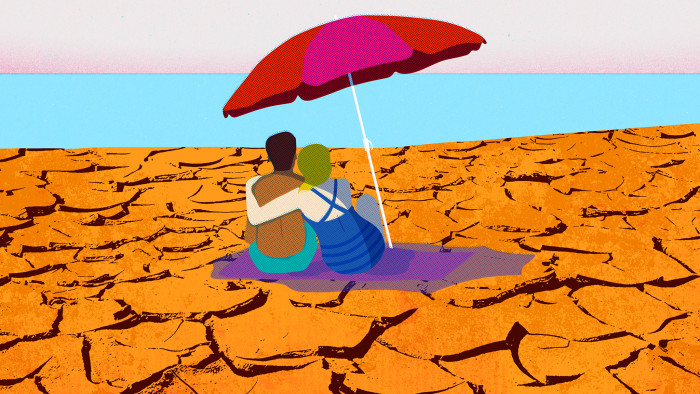As the climate changes, how will humans?


Roula Khalaf, Editor of the FT, selects her favourite stories in this weekly newsletter.
It has, by all accounts, been an unusual summer. Not just the politics of it, nor the fact that the world order has been lurching from crisis to crisis. But also, crucially, the weather.
Having moved to London only a few months ago, I arrived just in time for a tremendous heatwave. Coming from California, I was surprised to notice the mania with which everyone initially greeted the sun, stripping off their clothes at the faintest ray. Peak heatwave syndrome struck in late July, when the BBC helpfully ran an article titled “Sun cream: how much to use and what to do if you burn”.
After several weeks of this, I realised the changes went deeper than the sunburn. Between the heatwave and the World Cup, everyone had become cheerful, friendly — downright sunny. “If we had four months of sunshine a year,” a British friend declared one warm evening, “it would change the national psyche.”
Weather has an impact on all sectors of the economy as well, from farming to energy to sales of ice cream. In the UK, the heatwave helped to boost spending on food, drink, bars and hotels during July. The hot weather has hardly been limited to this country, although it has been much more damaging in other places. This summer has seen global heat records set from California, where it contributed to devastating wildfires, to Japan, which has reported more than 80 heat-related deaths.
Economists are increasingly studying how heatwaves affect economic output — what hot weather means for crop yields, labour productivity and crime — because these are seen not as one-time events but as harbingers of things to come. The world has already warmed about one degree since pre-industrial times and, barring drastic action, it is going to keep on warming.
But even while the experts research what this means for global trade or insurance premiums, living through the heatwaves has also highlighted how climate has an impact on life in ways that are much harder to measure. Plenty of big numbers have been crunched when it comes to global warming, but what does it mean for daily life, literature or art?
Looking back, there are some curious examples of the artistic and political consequences of great climatic change. The years of crop failure that preceded the start of the French Revolution in 1789 were exacerbated by the combination of a “little ice age” in Europe, an El Niño event and a volcanic eruption in Iceland that sent ash into the atmosphere. While climate was not the only cause, it certainly played a part.
Volcanic eruptions are in some ways the opposite of today’s heatwaves: by sending ash and sulphuric gases into the air, they create global cooling that can last years. But they can also serve as a guide to the way sudden changes in climate alter the way that people think, behave and create.
In 1815, the eruption of Mount Tambora spewed so much gas into the atmosphere that the following year was called “the year without summer”, a meteorological freak that scientists have been studying ever since — and which left a unique artistic legacy in Europe. Mary Shelley, on holiday at Lake Geneva but stuck inside due to the weather, penned Frankenstein, a grim horror tale. The changes in the weather were so great that many thought the world might be ending.
“I had a dream, which was not all a dream / The bright sun was extinguished, and the stars / Did wander darkling in the eternal space,” begins Lord Byron’s “Darkness”, a poem written that summer. Meanwhile Schubert composed dozens of Lieder that echo the coldness of the period.
Given all that gloomy romanticism, perhaps it is time to consider what the cultural output of the recent heatwaves will be. For Britain, some hints could come from the summer of 1976 — a scorcher that remains the hottest on record. That year saw groups such as Abba and Queen peak in popularity. Novels such as Ian McEwan’s The Cement Garden, published in 1978, featured unusual heatwaves.
This is not to suggest that global warming means Abba are going to make a serious comeback. Nor is the yardstick of cultural output the only — or even the primary — way that climate change will influence our lives. As the world warms, evidence suggests that more people will become refugees, and conflict will increase. Islands will sink beneath the rising seas, and mass extinctions will continue. It’s sobering to consider that, like the volcanic episodes of the past, we could be moving towards an era that feels apocalyptic. Literature will be no antidote.
But it’s still worth asking, as the Earth changes, how will humans change? Even a few warm weeks is enough to show the subtle ways that personality, creativity and social patterns can shift. For all the climate models and statistics that get used to describe our future on a warmer planet, the most personal effects may be ones that we cannot yet even imagine.
Leslie Hook is the FT’s environment and clean energy correspondent
Follow @FTMag on Twitter to find out about our latest stories first. Subscribe to FT Life on YouTube for the latest FT Weekend videos
Comments